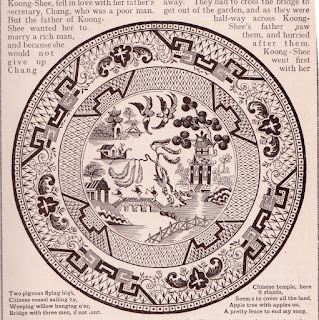 |
| Bertil Wreting/Fototeket/Nationalmuseum, Sweden |
The Legend of Blue Willow
Traditional
Long ago in China, there lived a very wealthy mandarin. He had a beautiful daughter named Koong Shee. The beautiful, young girl was the promised bride of Ta-Jin, a very old but wealthy merchant. The young girl however, fell in love with her father's secretary, a young man named Chang. Koong Shee and Chang would meet in secret beneath a large Willow tree and dream of their future together. Koong Shee was of noble descent and Chang was a mere commoner. So the young couple, no matter how great their love, would never be allowed to wed.
When the girl's father found out about their secret meetings, he was furious. He banished Chang and forbade his daughter from ever seeing Chang again. Koong Shee would sit beneath the Willow tree that had once been a place of joy and would quietly weep. Her heart was filled with pain. Not only had she lost Chang but Ta-Jin was a wicked man and a very difficult person to please. Koong Shee longed to see her handsome, young Chang and her thoughts would fill with the happiness they shared while sitting in this very same spot together.
As the day of the wedding drew near, Chang returned. He sent a message with Koong Shee's maid to meet him by the Willow tree. As Chang approached, he saw his beautiful Koong Shee sitting beneath the tree. Chang rushed to her side and once more held Koong Shee in his arms. They were so very much in love and did not want to be separated ever again. Chang and Koong Shee finally decided to elope and get married without her fathers permission. As they were starting to leave together, Koong Shee's father saw them and chased after the pair. The young couple raced across the bridge to a waiting boat and sailed away.
A storm developed and the boat sank at sea. Suddenly from out of the storm flew two snow white doves. Seeing the young couple's love for one another, the gods transformed Koong Shee and Chang into two beautiful white doves. These two doves have lived on forever and can still be seen today flying high above the Willow Tree where Koong Shee and Chang first pledged their love.
The Willow Legend
from the International Willow Collectors 1993 pamphlet
Long ago in China, in a magnificent pavilion surrounded by fruit trees, lived a Mandarin, his daughter Koong-shee and his young secretary, Chang. Chang and Koong-shee fell in love, but Chang was only a commoner, and she the daughter of a noble. Still, their love grew, and they met beneath a willow tree in the garden. But the Mandarin discovered their secret. Enraged, he banished Chang, and imprisoned Koong-shee by circling the pavilion with a zig-zag fence. Then he promised her hand to the Ta-Jin, a noble man far older than she.
Not long afterward, the Ta-Jin arrived in pomp and the wedding feast began. Wine flowed freely. When all grew sleepy with the wine, Chang crept into the pavilion, and he and Koong-shee fled through the hushed rooms, carrying a casket of her jewels. But just as they reached the outer door the Mandarin awoke, and in a drunken rage pursued them across the little bridge that spans the river. Koong-shee carried her distaff, a symbol of virginity; Chang carried the jewels; and the Mandarin followed, brandishing a whip. But the lovers escaped the Mandarin, hiding in the small pavilion at the far side of the bridge.
Here lived Koong-shee's maid and her husband, the Mandarin's gardener. They hated the tyrant, and welcomed the lovers in their home. But the Mandarin discovered them, and Chang and Koong-shee were forced to flee once more. They poled a tiny boat down the Yang-Tze until they came to a small island. Here, they thought they would be safe. Selling the casket of jewels, they bought the island, and built a lovely pavilion on it. Chang tilled the land until it blossomed with every kind of fruit and vegetable. So successful were his agricultural ventures, Chang wrote a book about how to cultivate the land. This book became so well known throughout China that even the Ta-Jin heard of it. Guessing who the author was, he sent his soldiers to the island, determined to avenge himself on the man who had stolen his bride-to-be.
The Ta-Jin's soldier came upon Chang as he was working his fields and slew him. Koong-shee, who had watched the entire scene from afar, rushed into their pavilion and set it afire, determined to be with Chang in death as she had been in life. The gods, looking down on the tragedy, took pity on the lovers and transformed them into a pair of earthly but immortal lovebirds. Until this day, we can see the faithful Chang and Koong-shee, flying high over the willow tree. Their story lives forever on the Willow-pattern plate.
The
Willow Pattern Plate
by
Horace Hutchinson, Westminster Gazette, Jan 1, 1912
Betty in her kitchen broke a
willow pattern plate.
I spoke to her severely, but I spoke a
moment late
To save those little people from a very dreadful
fate
Whose fortune's told in blue upon the willow pattern
plate.
Two blue little people come running, together
Across
a blue bridge, in the sunshiny weather,
They run from a garden,
where stands a blue tree
Above the house of a wealthy
Chinese.
The one is maiden, the other her lover
A blue weeping willow hang half the
bridge over.
Behind, in pursuit, comes papa with a whip,
But
they're over the bridge, and aboard the blue ship
That her lover
has moored by the strand of the sea
With a shove off the shore, from
his wrath they are free.
Now deep in the water their oars they
are plying,
While high in the heaven the blue doves are
flying.
To his blue island home her lover with waft her,
And
there they will happily live ever after.
This is the story of
the willow pattern plate,
So please be very careful-though it's
only one and eight
And remember that you have in hand
a very precious freight
When you carry from the kitchen a willow
pattern plate.
The
Legend of the Plate
Author
Unknown
My Willow ware plate has a story,
Pictorial, painted in blue
From the land of the tea and the tea
plant
And the little brown man with the queue.
What ever
the food you serve, daughter
Romance enters into the feast,
If
you only pay heed to the legend,
On the old china ware plate
from the East.
Koong Shee was a mandarin's daughter
And
Chang was her lover, ah me,
For surely her father's
accountant
Might never wed pretty Koong Shee
So Chang was
expelled from the compound,
The lovers' alliance to break,
And
pretty Koong Shee was imprisoned
In a little blue house by the
lake.
The doughty old mandarin reasoned
It was time that
his daughter should wed,
And the groom of his choice should
banish
That silly romance from her head.
For years had
great artists been stitching
In symbols the dress she should
wear,
Her headband of scarlet lay waiting,
She should ride
in a gold wedding chair.
He was busily plotting and
planning,
When a message was brought him one day,
Young
Chang had invaded the palace,
And taken his sweetheart
away.
They were over the bridge when he saw them,
They were
passing the big willow tree,
And a boat at the edge of the
water
Stood waiting for Chang and Koong Shee.
The furious
mandarin followed
The Groom with revenge in his eyes,
But
the little boat danced on the water
And traveled away with the
prize.
But vengeance pursued to their shelter
And burned
the pagoda, they say
From out of the flames rose the lovers
A
pair of doves winging away.
They flew toward the western
heavens
The pretty Koong Shee and her Chang
Or so says the
famous old legend
From the land of the Yangtze Kiang,
I
wouldn't be one to deny it,
For the little blue dove and her
mate
Forever are flying together
Across my Willow ware
plate.
An
Old Stafford-shire Rhyme
Two pigeons flying
high,
Chinese vessels sailing by,
Weeping willows hanging
o'er,
Bridge with three men, if not four,
Chinese temple,
there it stands,
Seems to take up all the land.
Apple tree with apples on,
A
pretty fence to end my song.
| Blue Willow china, c. late 1800s, various manufactures, Lahaina Heritage Museum |








